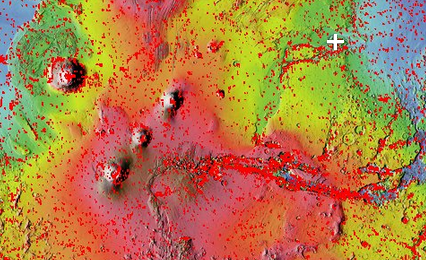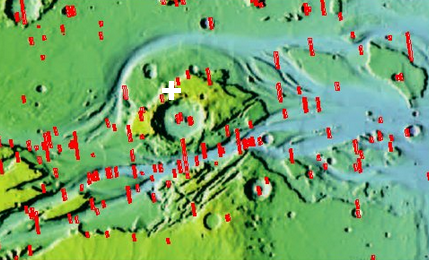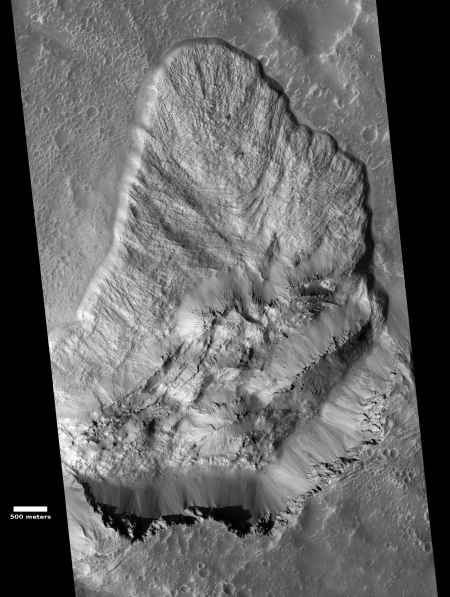Landslide on Mars
Cool image time! The image on the right, cropped and reduced in resolution to post here, was taken by Mars Reconnaissance Orbiter on May 30, 2018. It shows the remains of a landslide where it appears a huge chunk of the cliff face broke off and then flowed downward, pushing ahead of it more material to produce a tongue of debris more than four miles long. (If you click on the image you can see the full photograph.)
The picture invokes a spectacular single event. When the cliff broke off, it hit the ground below it like a rock would in wet beach mud. Like wet sand, the ground was pushed away in a muddy gloppy mess.
Is this terrain wet however? The location of this landslide provides some intriguing geological context. Below are two context images, showing this landslide’s location on Mars.


The top image on the right shows this landslide’s location relative to Mars’s four giant volcanoes, what scientists refer to as the Tharsis Bulge, and the great canyon Marineris Valles. The white cross indicates the location. As you can see, this landslide is located near the exit point of one of the many outflow channels that appear to flow down from the Tharsis Bulge. From this point the channels flow into what some scientists believe was an intermittent ocean in Mars’s lower elevation smooth northern plains.
The bottom image on the right zooms in, showing the specific features that surround the landslide. The landslide itself appears to be located on the outer edge of a large crater rim, and flowed downward away from the crater and into what appears to be a major meandering channel flowing around that crater.
So, what do these images suggest? They suggest that there was or is underground frozen water in the ground at this location, and that we should therefore not be surprised if the heat from the landslide helped loosen this and partly melt it so that the landslide debris flowed almost like wet mud.
Is that frozen water accessible? I would guess, based on these images, that it is likely heavily mixed with the ground, almost like ore, and that water recovery operations on Mars are going to function almost like modern mining on Earth. They will capture the ore, and then process it several times to leach out the water trapped therein.
On Christmas Eve 1968 three Americans became the first humans to visit another world. What they did to celebrate was unexpected and profound, and will be remembered throughout all human history. Genesis: the Story of Apollo 8, Robert Zimmerman's classic history of humanity's first journey to another world, tells that story, and it is now available as both an ebook and an audiobook, both with a foreword by Valerie Anders and a new introduction by Robert Zimmerman.
The print edition can be purchased at Amazon or from any other book seller. If you want an autographed copy the price is $60 for the hardback and $45 for the paperback, plus $8 shipping for each. Go here for purchasing details. The ebook is available everywhere for $5.99 (before discount) at amazon, or direct from my ebook publisher, ebookit. If you buy it from ebookit you don't support the big tech companies and the author gets a bigger cut much sooner.
The audiobook is also available at all these vendors, and is also free with a 30-day trial membership to Audible.
"Not simply about one mission, [Genesis] is also the history of America's quest for the moon... Zimmerman has done a masterful job of tying disparate events together into a solid account of one of America's greatest human triumphs."--San Antonio Express-News


